Dockworkers along the U.S. East Coast and Gulf Coast initiated their first large-scale strike in nearly five decades on Tuesday, halting operations across 36 ports and disrupting approximately half of the nation's ocean shipping. The strike comes after contract negotiations between the International Longshoremen’s Association (ILA) and the United States Maritime Alliance (USMX) employer group collapsed over wage disputes.
The strike, which started at 12:01 a.m. ET (0401 GMT), is impacting ports from Maine to Texas and halting shipments of goods ranging from food to automobiles. Analysts warn that the work stoppage could cost the economy billions of dollars daily and threaten jobs, while potentially fueling inflation.
President Joe Biden's administration has urged employers to improve their contract offer but has indicated it will not use federal authority to end the strike. “Shippers have made record profits since the pandemic,” said White House press secretary Karine Jean-Pierre, emphasizing the need for fair wages for port workers. Acting Secretary of Labor Julie Su also criticized employers for failing to present a suitable offer reflecting workers’ contributions.
The ILA, representing 45,000 port workers, rejected USMX's final contract proposal, stating that the offer "fell far short" of union demands. ILA President Harold Daggett noted that key employers, including Maersk and APM Terminals North America, have not agreed to adequate pay raises or protections against job-threatening automation projects. “We are prepared to fight as long as necessary,” Daggett said.
USMX responded with a statement asserting that its nearly 50% wage increase proposal exceeds other recent union settlements and addresses inflation concerns. However, Daggett maintains that the ILA seeks more, including a $5 hourly raise each year over a six-year contract.
The strike’s ripple effects are already apparent, with container ships lining up at U.S. ports and some businesses rushing to implement contingency plans. Retailers like Walmart and Costco have expedited shipments to avoid disruptions, while others, like Danish drugmaker Novo Nordisk, are considering air freight to minimize production delays.
If prolonged, the strike could lead to increased costs for U.S. consumers, as import prices rise.



 Asian Markets Slip as AI Spending Fears Shake Tech, Wall Street Futures Rebound
Asian Markets Slip as AI Spending Fears Shake Tech, Wall Street Futures Rebound  Dollar Near Two-Week High as Stock Rout, AI Concerns and Global Events Drive Market Volatility
Dollar Near Two-Week High as Stock Rout, AI Concerns and Global Events Drive Market Volatility  Singapore Budget 2026 Set for Fiscal Prudence as Growth Remains Resilient
Singapore Budget 2026 Set for Fiscal Prudence as Growth Remains Resilient  Asian Stocks Slip as Tech Rout Deepens, Japan Steadies Ahead of Election
Asian Stocks Slip as Tech Rout Deepens, Japan Steadies Ahead of Election  South Korea Assures U.S. on Trade Deal Commitments Amid Tariff Concerns
South Korea Assures U.S. on Trade Deal Commitments Amid Tariff Concerns  Gold and Silver Prices Slide as Dollar Strength and Easing Tensions Weigh on Metals
Gold and Silver Prices Slide as Dollar Strength and Easing Tensions Weigh on Metals  South Korea’s Weak Won Struggles as Retail Investors Pour Money Into U.S. Stocks
South Korea’s Weak Won Struggles as Retail Investors Pour Money Into U.S. Stocks  Thailand Inflation Remains Negative for 10th Straight Month in January
Thailand Inflation Remains Negative for 10th Straight Month in January  Japan Economy Poised for Q4 2025 Growth as Investment and Consumption Hold Firm
Japan Economy Poised for Q4 2025 Growth as Investment and Consumption Hold Firm  Oil Prices Slip as U.S.–Iran Talks Ease Supply Disruption Fears
Oil Prices Slip as U.S.–Iran Talks Ease Supply Disruption Fears  Silver Prices Plunge in Asian Trade as Dollar Strength Triggers Fresh Precious Metals Sell-Off
Silver Prices Plunge in Asian Trade as Dollar Strength Triggers Fresh Precious Metals Sell-Off  Fed Governor Lisa Cook Warns Inflation Risks Remain as Rates Stay Steady
Fed Governor Lisa Cook Warns Inflation Risks Remain as Rates Stay Steady  Gold Prices Slide Below $5,000 as Strong Dollar and Central Bank Outlook Weigh on Metals
Gold Prices Slide Below $5,000 as Strong Dollar and Central Bank Outlook Weigh on Metals  Oil Prices Slide on US-Iran Talks, Dollar Strength and Profit-Taking Pressure
Oil Prices Slide on US-Iran Talks, Dollar Strength and Profit-Taking Pressure  Trump Endorses Japan’s Sanae Takaichi Ahead of Crucial Election Amid Market and China Tensions
Trump Endorses Japan’s Sanae Takaichi Ahead of Crucial Election Amid Market and China Tensions  Bank of Japan Signals Readiness for Near-Term Rate Hike as Inflation Nears Target
Bank of Japan Signals Readiness for Near-Term Rate Hike as Inflation Nears Target  RBI Holds Repo Rate at 5.25% as India’s Growth Outlook Strengthens After U.S. Trade Deal
RBI Holds Repo Rate at 5.25% as India’s Growth Outlook Strengthens After U.S. Trade Deal 





























